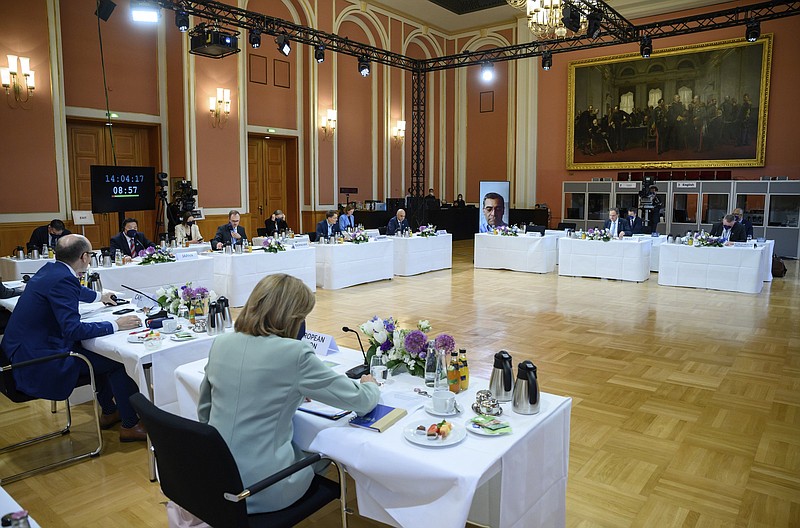G-7 plans against future pandemics
BERLIN -- The Group of Seven wealthy democracies announced plans Friday to strengthen epidemiological early-warning systems to detect infectious diseases with pandemic potential following the emergence of the coronavirus more than two years ago.
Germany's health minister, who hosted a two-day meeting of his G-7 counterparts in Berlin this week, said an existing World Health Organization office in Berlin would be used to gather and analyze data more quickly.
Health Minister Karl Lauterbach said the G-7 also wants to increase compulsory contributions to WHO by 50% in the long term to ensure the U.N. agency can perform fulfill its global leadership role.
The ministers who met in the Germany capital separately agreed to provide more support for developing new antibiotics that could be used to treat people infected with resistant strains of bacteria, which kill millions of patients each year.
Lauterbach said the G-7 also agreed to better protect the global population from the health impacts of global warming, including by making adaptation to climate change part of medical training.
The G-7 includes Canada, France, Germany, Italy, Japan, the United Kingdom and the United States.
Tigray rebels: Will free 4,000 prisoners
NAIROBI, Kenya -- The Tigray rebel forces fighting Ethiopia's federal army say they will release 4,000 prisoners of war as part of an amnesty.
The Tigray Peoples' Liberation Front announced the release on Twitter Friday, amid escalating arguments between Ethiopian and Tigray region officials over provocations and preparations for another round of full-blown war.
The Tigray forces decided to release 4,208 prisoners of war with an amnesty, out of which 401 are women, according to the tweet.
"Most of them were captured (in fighting) outside of the Tigray region, and others joined the fight in a forced conscription," Birhane Kebede, coordinator of the prisoners' center in the region, was quoted as saying by the regional ruling party. Birhane said those with disabilities, illnesses, and women who gave birth in detention were given priority for release.
The decision to release the prisoners followed weeks of talks held between military commanders on both sides, according to a foreign diplomat in Addis Ababa, who said talks at the political level have not yet taken place.
"These releases are probably both a sign of goodwill and also of the acute food shortage in Tigray," William Davison, the International Crisis Group's Senior Analyst for Ethiopia, told reporters.
"Now that aid flows to the [Tigray] region have increased amid a prolonged lull in large-scale fighting, the federal government should restore vital services such as banking and advance the peace process by opening talks on a permanent ceasefire with Tigray's leaders," he said.
Ethiopia's deadly civil war started in November 2020 after federal officials accused Tigray forces of attacking an army base in the region is believed to have caused the deaths of tens of thousands of people.
Italian missionaries abducted in Mali
BAMAKO, Mali -- Armed men have abducted an Italian family and their Togolese domestic worker in southern Mali, an official said Friday, the latest attack to target Westerners in the volatile West African country.
Chaka Coulibaly, mayor of the small town of Sincina, told reporters that the men had broken into the home of the Christian missionary couple on Thursday night.
The Italian couple are Jehovah's Witnesses and were working to set up a church in the commune, a member of Mali's small Christian community said.
Italian Foreign Minister Luigi Di Maio was following developments, the foreign ministry said, adding that its Crisis Unit "is carrying out the required verification and checking."
Turkish police break up LGBTQ parade
ISTANBUL — Police in Turkey broke up an LGBTQ pride parade at one the country’s top public universities and detained all of the participants Friday.
Riot police entered Bogazici University and surrounded dozens of students who were waiving rainbow flags and calling for tolerance. They arrested the students one by one and led them into police buses with their hands cuffed behind them.
A small group of students tried to resist arrest.
Turkish President Recep Tayyip Erdogan’s conservative government has banned LGBTQ parades since 2015, citing security concerns, “public sensitivities” and other issues. Authorities have ordered other LGBTQ events stopped as well.
Bogazici University students and staff have protested the university’s presidentially-appointed rectors since January 2021, demanding that academics who are elected by faculty members hold the position.
Tensions at the university heightened a month into the protests after a poster depicting the Islamic holy site Kaaba with LGBTQ flags appeared in a campus exhibition.
Turkey’s interior minister called the students involved “LGBT deviants,” and two were arrested on charges of inciting hatred and insulting religious values.
